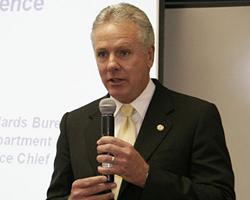Energy giant BP Plc said on Tuesday it had sharply increased the amount of oil it was capturing from its blown-out Gulf of Mexico well, but U.S. officials want to know exactly how much oil is still gushing out.The London-based company’s share price fell 6 percent in London trading after U.S. President Barack Obama said he wanted to know “whose ass to kick” over the massive spill.He told NBC News’ “Today” show that if BP Chief Executive Tony Hayward worked for him, he would have fired him by now over his response to the 50-day-old spill, the worst environmental disaster in U.S. history.
 BP already faces a criminal investigation and lawsuits over the April 20 explosion aboard the Deepwater Horizon oil rig that killed 11 workers and triggered the massive spill. Some 120 miles of U.S. coastline have been soiled in the disaster that threatens the Gulf Coast’s lucrative fishing industry.
BP already faces a criminal investigation and lawsuits over the April 20 explosion aboard the Deepwater Horizon oil rig that killed 11 workers and triggered the massive spill. Some 120 miles of U.S. coastline have been soiled in the disaster that threatens the Gulf Coast’s lucrative fishing industry.
The company said on Tuesday it had collected 14,800 barrels of oil on Monday, 33 percent higher than the amount collected on Sunday and the highest capture rate since it installed a new system to contain the oil spill last week.The latest attempt involves a containment cap placed on top of the gushing pipe on the ocean floor. The total amount of oil collected over four days was about 42,500 barrels, BP said.
“We continue to optimize production and make sure we can take much oil out of that stream as we can,” said Coast Guard Admiral Thad Allen, the top U.S. official overseeing the cleanup effort, speaking at a briefing in Washington.Allen said on Monday neither BP nor the government knew just how much oil was gushing out of the well in the first place. “That’s the big unknown right now,” he told a White House briefing on Monday.
BP has given conservative estimates of the oil flow that have been ridiculed by scientists and U.S. lawmakers. Even the government’s much higher estimates of 12,000-19,000 barrels a day seemed on the low side after Allen said the company planned to double its collection of oil from the well to 20,000 bpd (840,000 gallons/3.18 million liters).BP and government officials have said a definitive solution will not come until August when a relief well is drilled.
OBAMA HITS BACK AT CRITICS
The spill has fouled wildlife refuges in Louisiana and barrier islands in Mississippi and Alabama and also sent tar balls ashore on northwest beaches of Florida, where the $60 billion-a-year tourism industry accounts for nearly 1 million jobs.One-third of the Gulf’s federal waters, or 78,000 square miles (200,000 square km), remains closed to fishing, and the toll of dead and injured birds and marine animals is climbing.U.S. weather forecasters gave their first confirmation that some of the oil leaking from BP’s well has lingered beneath the surface rather than rising to the surface. Undersea oil depletes the water’s oxygen content and threatens marine life like mussels, clams, crabs, eels, jellyfish and shrimp.
Jane Lubchenco, administrator of the National Oceanic and Atmospheric Administration, said at the Washington briefing: “NOAA is confirming the presence of very low concentrations of subsurface oil.”Obama, who faces growing criticism that he has appeared detached from the economic and ecological catastrophe hitting four U.S. Gulf states, sharpened his criticism of BP in the NBC interview and hit back at his critics.”I was down there a month ago, before most of these talking heads were even paying attention to the Gulf,” he said.
“And I don’t sit around just talking to experts because this is a college seminar; we talk to these folks because they potentially have the best answers, so I know whose ass to kick,” he added.Fadel Gheit, an analyst at Oppenheimer and Co, said it was “not a coincidence” that BP’s shares were down after Obama’s “kick ass” comment.
The European oils sector was down overall, however, on the back of lower oil prices due to economic worries. BP shares were trading down about 5 percent, against a drop of 2.13 percent in the STOXX Europe 600 Oil and Gas index at 1600 GMT.In New York, the company’s American depositary shares were down nearly 5 percent. BP shares have lost about a third of their value since the crisis erupted.
Away from the action in the Gulf, the political heat remained intense in Washington with yet another congressional hearing to bring BP and its peers under renewed scrutiny.The Senate Judiciary Committee was holding a hearing titled: “The Risky Business of Big Oil: Have Recent Court Decisions and Liability Caps Encouraged Irresponsible Corporate Behavior?”Democrats in Congress have been looking at lifting such caps.
The Senate hearing follows one in Chalmette, Louisiana, where two women who lost their husbands in the explosion that unleashed the crisis urged members of Congress to hold BP accountable.”I am asking you to please consider harsh punishments on companies who choose to ignore safety standards before other families are destroyed,” said Courtney Kemp, whose husband, Wyatt, was killed in the explosion.(Reuters)


